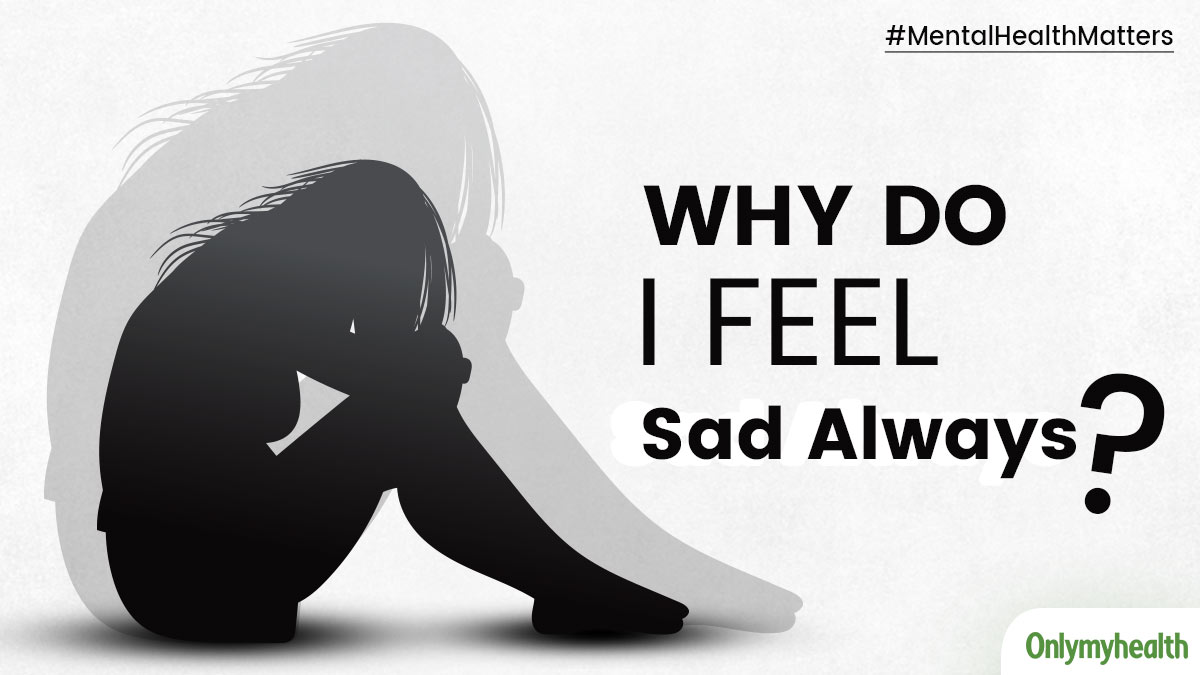
Feeling sad all the time is like carrying a heavy weight that refuses to leave your side. While being sad occasionally is normal, however, when sadness becomes a constant presence in your life, it can be a cause for concern. The first step to understanding why you feel sad all the time is to identify the potential underlying causes.
Table of Content:-
Archana Singhal, Counselor and Family Therapist, Founder, Mindwell Counsel, and Member of the Counsellors Council of India and WICCI NPWC, shares insights on why people feel sad all the time and what it tells about them.

Singhal said, “There are times when a person feels sad for a temporary period due to some disappointment or personal loss. This tends to disappear when you spend time with your loved ones or do something you like. However, if you are feeling sad all the time and are not able to avoid it, it leaves you feeling heavy, empty inside, and defeated.”
According to the National Mental Health Programme (NMHP), 6-7% of the population is affected by mental illnesses. The huge treatment gap is mostly due to a lack of understanding about the signs and symptoms of mental illness, myths and stigma associated with it, ignorance of the types of treatments that are available, and the advantages of getting therapy.

Reasons For Constant Sadness
Singhal listed a few potential causes of persistent sadness as follows:

Lack of satisfaction in various aspects of life
Feeling constantly unsatisfied in your career, education, family life, social interactions, or romantic relationships can contribute to ongoing sadness. When these areas of life don't meet your expectations or bring fulfilment, it can lead to a constant sense of unhappiness.
Constant comparison to others
Singhal said that comparing yourself to others can be detrimental to your mental well-being. If you constantly measure your life against someone else's achievements or possessions, it can create a sense of inadequacy and dissatisfaction, resulting in persistent sadness.
Also Read: Mental Health Matters: Mental Disorders and FAQs Related To Them

Unrealistic expectations
Setting unrealistic expectations for yourself can lead to continuous disappointment. When you constantly strive for perfection or place excessive pressure on yourself, it becomes challenging to meet those high standards, leading to a constant feeling of sadness and frustration.
People-pleasing and fear of failure
Being a people-pleaser and constantly worrying about letting others down can be emotionally draining. The fear of failure and the pressure to meet others' expectations can contribute to persistent sadness and self-doubt.
Neglecting self-care and joy
Neglecting self-care and not making time for activities that bring you joy can leave you feeling empty and unfulfilled. Without prioritising your well-being and engaging in activities that nourish your soul, sadness can become a constant presence in your life.
Depression
Singhal said, “Depression is a common mental health condition that can lead to persistent sadness, hopelessness, and low mood. It often affects various aspects of life, interfering with relationships, work, and daily functioning.”
Hormonal changes
Our mood is greatly influenced by hormones. Even minor shifts in hormonal balance can impact our emotional state. Hormonal changes during puberty, menstrual cycles, pregnancy, or menopause can contribute to persistent sadness and mood fluctuations.

Seasonal Affective Disorder (SAD)
SAD is a form of depression that happens every year around the same period, typically in the autumn and winter. It is triggered by reduced sunlight exposure and can lead to symptoms, such as sadness, low energy, and changes in appetite.
Also Read: Mental Health Matters: What Is Personality Disorder, Explained
Chronic stress
Chronic stress can manifest in various ways, including feelings of sadness, irritability, and nervousness. Prolonged exposure to stressors without adequate coping mechanisms can impact your emotional well-being and contribute to ongoing sadness.
How To Deal With Sadness

Talk to loved ones
Singhal said, “It's common to isolate yourself when you're feeling down, but reaching out to trusted friends or family members can provide tremendous support.” Sharing your feelings with someone who cares about you can help alleviate the burden you're carrying. They can offer comfort, understanding, and even helpful advice or perspectives.
Add a little humour
Even if you're not in the mood for laughter, engaging in activities that bring a sense of lightness can be beneficial. Watching a favourite sitcom or comedy show, reading a funny book, or even browsing through humorous content online can help shift your mood and provide a temporary escape from sadness.

Find comfort in music
Music has a powerful impact on our emotions. Listening to uplifting or soothing music can help uplift your energy and provide a break from the constant fatigue often associated with sadness. Singing along, dancing, or playing a musical instrument can also be therapeutic and help release emotional tension.
Engage in self-care activities
It's important to look after yourself when you're sad. Participate in relaxing things that you enjoy. This could include taking a warm bath, practising mindfulness or meditation, going for a walk in nature, spending time with pets, engaging in hobbies or creative outlets, or pampering yourself with a favourite activity or treat.

Bottomline
Singhal concluded, “Feeling sad all the time doesn't necessarily mean depression, it might be that you must be going through something challenging or you might have plenty of emotions inside you. If your sadness persists and significantly impacts your daily life, it's important to consider seeking professional help. A mental health professional, such as a therapist or counsellor, can provide guidance, support, and evidence-based techniques to manage your emotions.”
Disclaimer
The information provided in this article is by a registered healthcare professional. However, we advise you to consult your own professional for a diagnosis catered to your needs.
Also watch this video
How we keep this article up to date:
We work with experts and keep a close eye on the latest in health and wellness. Whenever there is a new research or helpful information, we update our articles with accurate and useful advice.
Current Version